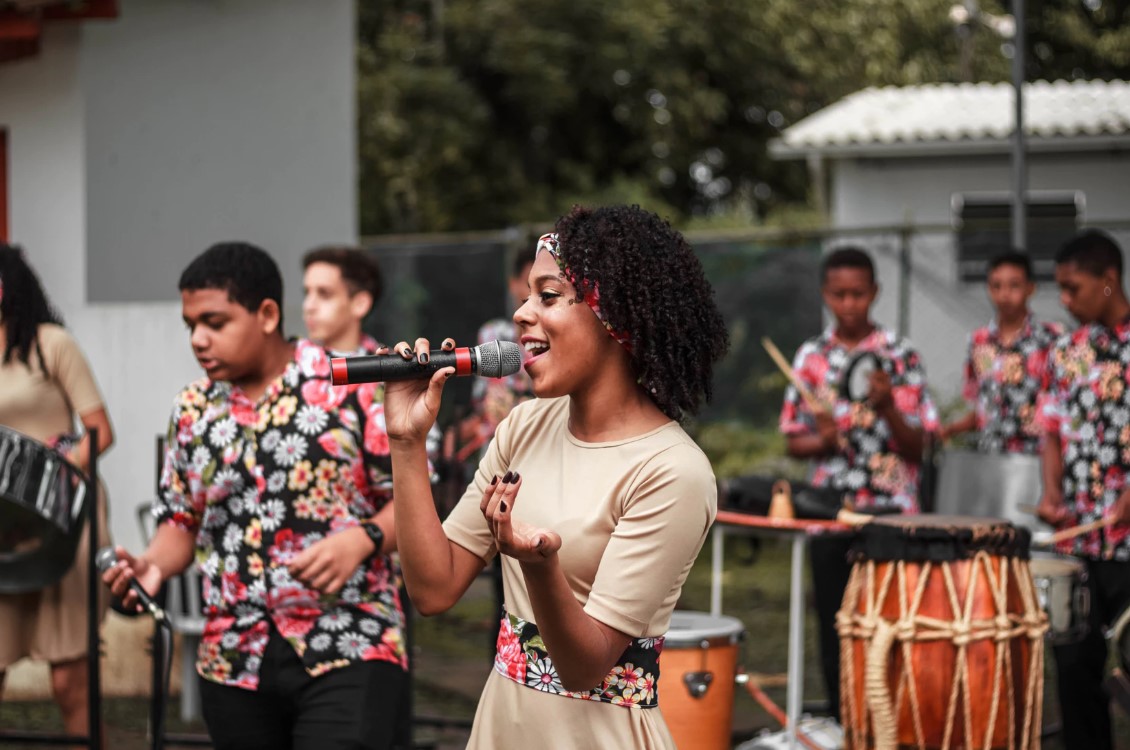9 Great Tips to Learn English Through Songs and Music

Can you learn a new language through music? Of course you can! Listening to English songs is a really useful method for improving your Eglish. On the plus side, every single one of us does it, so it's only right to make the best of it.
But, how much are you actually learning from your favorite music?
Think of it as food. We eat on a daily basis but eating healthy makes all the difference in the world. It provides results.
In fact, studies have shown that children who are exposed to music before the age of seven develop bigger vocabularies, a better sense of grammar, and a higher verbal IQ.
There is a difference between simply listening to English songs and learning from them.
This article will help you determine just how effectively you are using your favorite songs to improve your English and what steps you can take to do achieve the results you want when it comes to your fluency.
Let the music play...

How Songs Help You Learn a Language
Ever had a song stuck in your head? Me too! Listening or repeating the lyrics of favorite English songs - even humming them - is likely to improve one or all of the following aspects of your language proficiency:
-
Vocabulary: Repeating song lyrics is a proven way of mastering new words and phrases quickly, especially in music genres that utilize a lot of words. Think of it as regular word repetition in English classes but with background music.
-
Grammar. While there are more effective methods to learn how to use English grammar in a structured way, listening to English songs can help you master and use certain grammar patterns correctly in everyday conversation.
-
Pronunciation and accent. Singing along with your favorite English songs also helps to reduce your accent and learn more about how to link words together when you speak, which greatly improves your pronunciation.
See, your favorite songs can not only help you self-study English but they make learning fun, as well. Now, let's take a look at how to use the songs you love to improve English vocabulary, grammar or pronunciation.

The Best Ways to Learn English through Music
There are a few different must-dos for learning English through music - from picking songs that are challenging you to thinking of them as exercises on the go. Either way, you can always achieve more than just singing along.
1. Choose your songs wisely.
This might seem obvious but many learners fail at this simple step. The reason? They either listen to random songs on the radio or pick whatever hot songs are currently trending on Spotify or YouTube.
As simple as this sounds, to effectively learn English through songs, you must choose songs that you like - songs that you'll live with and listen to a hundred times! That way, you'll want to listen to them and want to learn the words in your target language.
2. Stick to an effective genre.
I've spoken about this at length in a previous article of mine.
It is proven that genres like hip-hop have a much higher impact on language learning than pop, for example, as hip-hop songs generally have a rich vocabulary, complex rhyming schemes, and often use slang that is good for everyday communication.
3. Look up lyrics.
If you come across words that are unfamiliar to you or you cannot guess the meaning of certain phrases from context, simply look up the song's lyrics. Sites like Genius do an awesome job at providing correct lyrics to most songs out there, which include annotations and explanations written by the artists themselves. How cool is that?!
4. Make vocabulary searches a habit.
While you're in the process of looking up lyrics, why not make it a habit?
If finding the correct lyrics is not enough for you to understand a song, you can always use a dictionary and learn a new word or two. It never hurts to build a habit that not only helps you learn songs that you like but to improve your English fluency, as well.

5. Find the right music resources.
Apart from the obvious choices in YouTube, Pandora, and Spotify, there are plenty of online resources that help you listen to music while learning English. You can have fun while improving your reading, listening, and pronunciation skills all at the same time.
Some resources worth checking out are Language Zen, LyricsGaps, and LyricsTraining.
6. Karaoke!
Need I say more? Essentially, karaoke combines all of the previous five tips into one. The result? A highly amusing and effective language learning method (preferably done with a bunch of friends). Try it out!
7. Music exchange.
Got a friend from an English speaking country? A "Skypal"? Share the music from your area with them, and vice versa. You can exchange opinions about the songs hence participate in conversations, learn new words and meanings, and so much more.
8. Talk about music.
Talking about music with friends and family is a cool method of improving both your conversation skills and vocabulary. The thing is: when talking about songs, in general, you will inevitably use some musical slang that is uncommon in everyday speech.
You will have to learn English words and phrases like: tune (song), catchy (easy to remember), one-hit wonder (an artist with only one successful song), and more.
On the bright side, you can never know too many words, right?
9. Listen and learn on the go.
The most effective thing you can do is to always remember and be aware that while you are enjoying your favorite music, you are also in the middle of a language exercise. You are learning. This awareness will help you go a long way!
In other words, if you're not even focused on learning, how can you expect learning to happen? You must raise your own awareness of today's tips and tricks before you can expect real results and improvements in your English fluency.

Make Learning Fun!
In conclusion, we can say that learning languages through music turns studying into fun. Plus, nowadays you can easily share this knowledge at the touch of a button, whether through YouTube, Pandora or Spotify.
Music is the greatest communication in the world. Even if people don't understand the language that you're singing in, they still know good music when they hear it. - Lou Rawls
I encourage you to share these tips with your friends, teachers, and other music lovers! Until next time, dum-diri-dum-dum! Oh, and happy learning, everyone!
